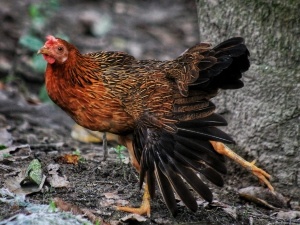
Chickens are very active animals, these birds spend their days scratching around in the grass, running after each other, taking dust baths, and laying in the sun, so it’s safe to say that their legs are very important to them.
But why do some birds have trouble walking and standing? This article looks into it.
Table of Contents
Chicken having trouble walking and standing:
If your chicken has trouble walking and standing then it is likely quite sick. Birds try to mask signs of being sick as best they can, this is ingrained in them and is what has kept them from looking like easy targets to predators in the wild.
Here are possible reasons why your bird may have trouble walking and standing:
Nutrient deficiencies:
Chickens can become partially paralyzed if they lack vitamin B, thiamine, or selenium. A lack of these nutrients can cause the bird to lose balance, lose coordination, develop standing problems and develop walking problems.
What to do:
You need to test your bird to see if it’s partially paralyzed. Do this by pressing your finger on the bottom of each of your bird’s feet to see if it reacts.
If the bird’s foot is working just fine then the bird will curl its toes as a reaction to you pressing against the foot. The bird will also likely yank its foot away when you do this. If the bird does not react with one foot then the bird may be partially paralyzed
If you realize that your bird is partially paralyzed then you’d need to have a look at their diet to see if they lack the vitamins mentioned above.
Solve your bird’s nutrient deficiency problem by making sure that the bird gets the correct feed for her age, breed, and weight. The appropriate feed will contain all the vitamins and minerals that the bird needs to maintain good health.
You may also want to add Polyvisol infant vitamins (the one without iron) into the bird’s water to get her to ingest more vitamins. Give the bird 1-2 drops of Polyvisol a day. You can alternatively give the bird poultry vitamins.
Give the vitamins or Polyvisol for a couple of days and see if the bird improves. If not, take the bird to the vet.
Mareks disease:
If your birds are older than six weeks old or younger than six months old then your bird may have Marek’s disease. If your bird is not in this age range then your bird may also have Marek’s but the chances of this are slimmer.
Mareks disease is a very common chicken disease, there are different types of Marek’s but the type that can cause paralysis or partial paralysis in your bird is called classical Mareks.
If your bird has trouble walking and standing, has difficulty breathing, has a dilated crop, then your bird may have Marek’s
What to do:
There is no cure or treatment for Marek’s disease.
Not all birds that have this disease will show symptoms, in fact, your birds may come in contact with a bird that has Marek’s, may be sick, and you may not even know that the bird has this illness because they don’t show signs or symptoms.
Chickens who are infected with this disease will live normal lives until the disease progresses.
If the disease progresses to a point where the bird develops tumors on its vital organs, and the bird develops paralysis, then the bird will most likely die
Botulism:
Botulism is another illness that can cause your bird to suddenly have trouble walking and standing.
This illness is caused by the bacteria Clostridium botulinum. The Clostridium botulinum bacteria is quite common and is harmless until it has the opportunity to reproduce in a warm, moist, anaerobic environment.
Once this happens, the bacteria will produce a neurotoxin that is deadly to chickens.
Clostridium botulinum can reproduce in dead animals, rotting fruits and vegetables, stagnant and slow-moving water, and in insect larvae, all of which look very attractive to chickens.
The neurotoxin produced causes birds to develop floppy paralysis, this paralysis is the type that causes birds to lose control of their limbs and thus, have trouble standing and walking.
If your bird has this, then the bird will eventually not be able to hold its head up.
What to do:
Taking the bird to the vet to be examined and tested for botulism is recommended. If it is found that your bird does have botulism then the vet will prescribe antibiotics to your bird, and the vet may also prescribe selenium to your bird.
It would be best if you remove all the possible botulism sources on your property so other birds don’t get exposed to it. Disinfecting the area is also recommended.
FAQ:
Why is my chicken walking like it’s drunk?
If your chicken is walking like it is drunk then the bird may have encephalitis, it may have been exposed to toxins, or, it may be suffering from a nutritional deficiency.
Why is my chicken squatting while walking?
If your pet chicken squats while walking then the animal is simply trying to protect itself.
Squatting while walking protects the animal’s underbelly from predators, the underbelly is a vulnerable part of the animal’s body.
If you enjoyed this article then you may also be interested in other chicken related articles. Here are some articles that you may be interested in: Electrolytes And Probiotics For Chickens, Traumatized Chicken Behavior, How To Help A Sick Chicken Gain Weight, Do Chickens Feel Pain?, Lethargic Baby Chick With Closed Eyes,

